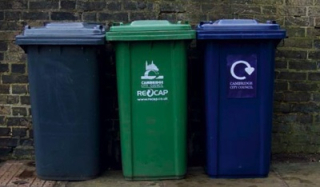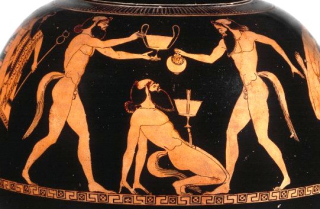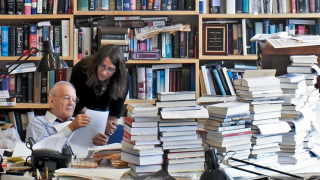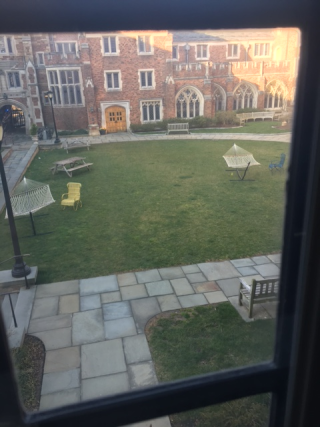Mary Beard's Blog, page 3
May 17, 2017
We'll always have Paris
It was the time for the Newnham Classics annual trip to Paris and the annual pic in the Palais Royal (above). Thanks to generous donations, we go off for a (long) day to Paris each May, for a bit of serious study in the Louvre and a long lunch (at La Table du Palais Royal).
In my experience, it���s where those revision anxieties get dealt with best.
And the Louvre does always make you look at things afresh and again ��� or at least feel you are. Especially when I manage to take us on a lengthy dead end through Egypt till we eventually get back to Classical art (how many times have you been here before, Beard?)
This year we spent quite a lot of time with the Louvre version of the ���Boy with the Goose��� (playing with it? strangling it? that���s always been the question).
We have looked at this many times before, but it is a perfect example of searching for what is really ancient and what is restoration. The more you look at this, the more you see that almost all the distinctive bits are not ancient at all.
Like the head on the boy (with its slightly odd top-knot) and the head on the goose. Careful examination shows that the webbed feet are ancient, but the brilliantly scaly legs aren���t; likewise any seriously feathered bit of the goose is somewhere c 18th century.
Yes, you could do all this in the UK, but there is something about going away that helps you look harder. We are very lucky to be able to do it.
May 14, 2017
Dustbin politics
I only half listened with interest to the family May on the sofa last week. But I was particularly interested in the idea that Mr May was the family bin man.
This is because participant observation over the last decade or so has convinced me that one of the major gender divisions in the modern partnership is over bins, not just putting them out, or pulling them in, but strategising about them.
I don���t know a single woman with a male partner over about 40 (and it may go earlier) who does not tell the same story. He really makes a big deal over the whole bin business. He has a timetable of when the black bins go out, versus the blue and the black. He tends to be a bit anal about what exactly goes into what. And he will phone or email or text when away, even when half way across the globe, to check that the unreliable partner really will be putting the green and blue out tomorrow (bearing in mind that last week was a bank holiday, and that so the days would have been shifted���.etc etc). The women by contrast tend to say, oh well ��� they can always be collected in a fortnight, not the end of the world (and frankly, so what if I have just this once put the bubble wrap in the damn wrong bin, thousands and thousand of people must do that��� sorry, recyclers!)
What puzzles me is first the universality of this. So far as I can tell, it crosses professional and ���class��� boundaries (you can go into any gathering of women over a certain age and have them instantly bonded by the ���bin word���). But it is also the origin. I don���t remember, when we had all those old aluminium bins, that the guys took quite such an interest. I can only assume that the whole science of recycling has tended to push the bins up into ���male science���. Any other explanations?
May 11, 2017
Manifestos
It doesn���t look as if one of the things I hoped for out of the election campaign a few weeks ago has a cat in hell���s chance of coming about. That is to say, there is not much sign of there being serious discussion of the real practicalities of Brexit. There are a few gestures to ���the people want to know what Brexit will mean���, but there is much more of either (1) ���we have taken a decision and people accept/are happy with that��� or (2) the repetition of the same old slogans (���control of our borders��� . . . . it���s largely people living in Northern Ireland who want to see some flesh on that, for obvious reason) or (3) dire warnings that too frank a discussion of what we want out of Brexit will damage Mrs May���s negotiating hand (a rather alarming clash with democratic debate, one cant help feeling).
I guess one shouldn���t say anything too much about the manifestos as yet, even about the leaked Labour document (where, as the husband pointed out, it was hard to take the media line that the leaking of it showed that Labour couldn���t run a chip shop, when they had happily published a document clearly marked as ���Confidential���; you can see what they mean, but the holier than thou tone was a bit dodgy !)
But so far, it looks like the same old problems. It���s not clear what we think a manifesto is actually for ��� beyond the obvious answer that���s for saying what the party wants to do. But is this meant to be the ���vision��� or is it ���what we have a commitment to do in the next term of government��� or is it rather an advertisement? Or what combination of the three? In some ways, the parties really cant win: if they do the vision thing, then they get criticised for pies in the sky. If they have precise proposals with detailed costing it all looks like a bit un-ambitious. Maybe when we see the actual documents, we will find that they have managed the problem brilliantly, but I rather doubt it.
I bet that there will be plenty of those political sound bites that mean precisely nothing. As I (and plenty of others) have said too often before, there is no point in arguing for something if no one could reasonably argue the reverse. ���Strong and stable��� is a classic example of that. Who is going to get up and argue for a ���weak and unstable��� leader? And ���For the many not the few��� isn���t much better either. If political decisions come down to something little more than advertising slogans, we���re lost. I would prefer ���Vorsprung durch Technik��� honestly.
And on immigration I bet all the figures that get thrown around (from ���one in one out���, through ���tens of thousands��� to ���no cap���) will not be based on the some proper discussion and projection of workforce needs. Now there are, of course, all kinds of other issues of social morality bound up with the issues of migration. But there is a bottom line question that needs to be answered. That is, over the next 5, 10, 20 years, how is the United Kingdom (if United is what is still is) going to provide the workforce for the jobs it needs to have fulfilled, from the caring professions to hi tech industry? And how do we think those needs will change in the medium to long term? How much of this can we provide ourselves? How and from where do we make up any deficit ��� whether that is providing different skills training or incentives internally or getting it from elsewhere).
Now in all kinds of ways, I don���t much like the thought of a rich first world country looking at, say, its social care needs and deciding to meet them by importing low paid workers (which, lets face it, is partly what it currently comes down to). But unless we have looked at those basic calculations, we can���t even start to have a reasonable discussion about migration. I don���t know what the answer is, but people who have a clearer demographic idea than I do (and there are plenty of them) suggest that 10���s of thousands is not likely to be enough ��� if, for example, my generation want to have a tolerably looked after old age.
Apart from all the other reasons at finding it distasteful, ���One in, One out��� will not end up looking like a very patriotic slogan if it means we don���t have the workforce to do exactly that.
May 6, 2017
How long can it take to write a paragraph?
Answer: in my case recently about three days, or ��� more accurately ��� about three days of repeatedly getting a few lines down on the screen, then either deleting them or transferring them to a separate document rather sweetly entitled ���bits and pieces��� and starting all over again.
Writing is a rum trade. Sometimes it proceeds at a satisfyingly steady, even if not all that speedy, pace (I reckon that 1000 good words a day is all that I can ever consistently manage; anything more is a bonus���and such bonuses come rarely). Other times it grinds it a halt. It���s not that there is anything obviously the matter with the damn paragraph. It might even contain a few rather natty phrases (hence the ���bits and pieces��� document ��� you don���t want to lose them). But you find yourself looking at it with glazed eyes and unable to move on (that I think is the killer: you know that a paragraph is not right if it doesn���t launch you into the next one). So you have another go, then another, then a cup of coffee, then another go, then you see if a glass of wine will help (one sometimes does, two never), and so on.
I have now learned that when this happens it is not because of any failing of rhetoric. It is because I am trying to say the wrong thing (as one of my Twitter friends said, when I confessed this in 140 characters: ���Mate of mine once said she���d learned one thing as a writer ��� if you have to charge the door with your shoulder you���re trying the wrong door������ and I think that about sums it up).
The trouble is that is can take several days to see what���s wrong, or where the right door might be. In my case this week, I was trying to write the last 3000 words in a chapter of which I had already written 7000. Those 7000 are about the twists and turns, mainly since the early nineteenth century, in how ancient images of Julius Caesar have been identified (and there are some wonderfully revealing and quite funny stories to tell). The final 3000 look ahead to the rest of the Suetonian 12 Caesars.
The offending paragraph was trying to lay out the case for the methods of identifying all those later rulers being completely different. Now, there are some significant differences (as you will see if you buy the book in due course), and it was these I was trying to point up. But actually it is wrong to say that the methods are ���completely��� different. In fact, in many ways the intriguing puzzles in the identification of Caesar provide a rather good base for exploring the identification of all the others.
To put it another way��� and this is what hit me first ��� why on earth, Beard, did you ask your punters to read 7000 words about busts of Caesar, fun as some of those words were, if in the end you were going to turn round and say��� ���ah ha, none of that is relevant to any other emperor at all���? It���s not only untrue, it���s an impossible sell to the readership. And that, of course, is why I couldn���t write it.
I very much hope that this is now sussed. Well, I have get 700 more words I am fairly happy with, so fingers crossed.
May 3, 2017
Ivy League vs Russell Group
I can���t bear educational tourism. I don���t mean by that what I am doing now (hunkering down in some wonderful libraries, with great colleagues, in Yale). I mean the old story in which some education minister (or shadow) pops off to see schools in Finland or uni���s in the United States, and comes back with ���the answer���. Look, they say, you poor Oxbridge types are simply hopeless compared with the forward looking radicals in the US, who have diversity sorted, brilliant scholarships for those without money, and a commitment to ���access��� beyond anything in the UK. Come on Cambridge, get out of the complacent bubble and look to Harvard.
OK, two things to say to start with. First, I am sure you can learn all kinds of things from other countries��� systems (that���s one of the spin off from being in a different place for a few weeks, like I am now). Second, wherever in the world I have gone, I have never met any Faculty at ���elite��� uni���s who were not committed to widening and diversifying access (put that another way, I have never met anyone who would prefer to teach rich privileged thick kids over clever underprivileged outsiders).
The problem is how you can be sure of identifying the really talented without simply imposing your own cultural norms, or more broadly how you ration the places when there are vastly more well qualified applicants than you can ever take. The truth is that there is no right answer or quick fix, and the more you look at other systems the more incommensurate they are. The big problems that different systems face are embedded in different histories, financial arrangements and in institutional infrastructure.
While I have been in the US, I have been struck by the issue of ���legacy places��� in some elite universities: that is, basically giving a leg up to those potential students whose parents once attended the uni. It���s hard to get exactly to the bottom of this, as there is quite a lot of ���confidentiality���. But it seems pretty clear that, for various different reasons, in many universities kids with a ���legacy��� have up to three times better a chance of getting a place than those without (at Stanford, for example, until recently at least, a ���legacy applicant���s��� papers were read by two admissions officers, not one, as was the case for the rest . . . just to make sure they had a really fair crack at the whip).
Thing may have changed in the last couple of years. And there are all kinds of historic reasons for this (the dependence of elite uni���s on donations being one), and all kinds of possible, if specious, justifications (it is the legacies of the legacy students that provide the funds for the scholarships���). But just imagine the furore there would be in the UK if there was a systematic way of providing an apparently ���easier��� route into Cambridge for those who were children of Cambridge alums (what an earth would a government minister say if we said that the application forms of those whose parents went to Cambridge got twice as much attention as the rest?). It must have been at least thirty years ago that the question on the Cambridge application form, which did ask whether either parent had been to Cambridge, was abolished.
My point is that we are all trying our best, really we are, to level the playing field for admissions, to conquer want bias we may have, etc . . . (while knowing that we will always end up rejecting brilliant applicants). But the naive assumption, after a whistle-stop tour of Harvard/Yale/Princeton etc, that all we in the UK need to do is copy the States is ignorant ��� and insulting (to all sides).
April 29, 2017
Sex education at the British Museum
I was woken up in the middle of the night in the USA by a nice man from the BBC who was keen to know what I thought about the British Museum���s plan to offer sex education classes. I knew nothing about this, and in retrospect, when I woke up again, I assumed that there was some weird misunderstanding.
It does, however, appear that the BM does think that it has a role to play in educating the nation���s young in ���the birds and the bees���, informed consent, transgender politics etc, as you can see here. And it is making a pitch for the museum collection as an eye opener to the different cultural norms behind sexual and ideology.
I have a good deal of sympathy with the basic position. That is to say, there is nothing as good at exposing one���s own arbitrary norms as looking at the arbitrary norms of the past. Part of the point of history is, after all, to show us how WE look by the standards of other times and places.
But I wonder how effective this is when done head on, in dedicated sex classes at the museum. And I wonder how difficult it is going to be to police the government���s norms in all this. What, for example, is the line going to be about Greek paedophilia? Assuming that the Athenian norm (and it was probably wider than Athens) was for adult men to have sexual relations with boys, how is the museum going to approach that? Just as another bit of cultural relativism? That might be the historical logic of it. But it doesn���t quite fit our own legal framework. So how is the discussion going to go?
I can���t help thinking that some of these questions might be better treated not quite so ���head on���. And I am not entirely certain that the future of museums is in sex education, whatever box it ticks on a list of some government demands for museums��� obligations to the community.
Though I do think that the images on the wine cooler above does offer some warnings about what you might do while very pissed: too much wine can bring out the beast in you.
April 26, 2017
The Silvers Memorial
This morning I got a ridiculously early train from New Haven to New York (couldn���t risk being late) to go to, and speak briefly at, the memorial meeting for Bob Silvers at the New York Public Library. It was a big occasion, with 400 people or so, and a range of contributions from about 15 or us ��� including some brilliant ���out-takes��� from Martin Scorsese���s documentary on the New York Review of Books.
The contributions took many forms. Some were movingly personal, some (like mine) a bit shorter and inevitably a bit more ���hands off��� (even if not distant). There was hardly a duff note, I thought, in what was almost two hours of celebration. And almost everything sticks in the mind. But I thought I would share two particular moments.
First, Daniel Mendelsohn told a wonderful anecdote about all those rumours going back years about what was going to happen to the NYRB when Silvers stepped down, what was the succession plan, etc ���. when he had shared some of this with Silvers, the reply had been a wonderfully characteristic quip: words to the effect of ���we don���t step down, we step up��� (in Daniel���s much richer and circumstantial version, with perfect comic timing, it was funnier ��� but you get the point).
And then there was a great bit from the Scorsese film, an out-take just focusing on Bob���s story about getting Arnaldo Momigliano to review Isaiah Berlin���s book on Vico. It���s a long story of the potential clashes between probity and friendship, told by Bob with a wonderful twinkle in the eye. Momigliano had been pretty carping and almost embarassingly sour about the Vico book, despite being a friend of Berlin. Bob explains, in the clip we saw, that he wondered if there wasn���t something that could be said about the book that would lighten the criticism just a little. Didn���t Berlin have a point, he suggested to Mom, about the influence of the 18th century Neapolitan jurists on Vico? Mom���s reply: ���have you actually read those 18th century Neapolitan jurists?��� (I can just imagine him saying that.)
Again it is hard quite to capture the flavour, and it might seem, as I tell it, all a bit in-groupy. But the sense of the delicate balance between fairness, wit and real learning comes over strong (and, in case you wonder, the review was published with all its carps . . . as Bob goes onto explain, the NYRB has a long tradition in publishing bad reviews of books by its own friends and contributors).
Anyway it was a moving occasion, and the first and probably the last time I shall ever appear in the same line up as Patti Smith. She sang ���Wing��� for Bob (the temptation to go up and ask her to sing ���Horses��� too was almost irresistible).
If you want to know what happened next, I zoomed back to Yale on a train, to take the part of Caligula in a balloon debate (versus Augustus, Nero and Trajan). I lost, despite a brave try to right the bad reputation that poor Caligula (Gaius as we should call him) has suffered for years, though the other villain, Nero, romped home on a platform of shameless villainy. And as the visitor I got the prize of the bottle anyway!
It was a finely poised debate, but I was very relieved that the chair made clear that we were all speaking ���in character���, as when you start to ventriloquize a Roman emperor, you almost inevitably become more than a little politically incorrect for a 21st century university. But that I suppose is the point.
April 22, 2017
The capture of the Westmorland
One of the pleasures of going to work in a less familiar place (for me currently Yale) is that you find new books. They are often books that are available in your own usual habitat, but for some reason you just don���t notice them. (The cheap comparison is with going to a new supermarket, where the layout of shelves and aisles simply makes you notice stuff that was probably in your trusty local Sainsbury/Tesco/Waitrose all along��� but never sprang to the eye.)
Anyway thanks to the Yale Center for Britsh Art, I have had my nose rubbed in a book I should have been using for ages. In fact, it is the catalogue of an exhibition that was for a while at the Ashmolean in 2012, and I never noticed. So doubly remiss.
It is The English Prize, which documents the contents of a ship that sailed from Livorno in 1778 and was soon captured by the French and taken to Malaga, where the contents were inventoried ��� and most ended up being bought by the King of Spain (and still in Spanish collections).
And what were these contents? Well, a good number were crates being sent home to England by men on the Grand Tour, and give us a good sense of what they were actually buying in Italy (and, yes, there is one Roman emperor���s head���).
There���s been a lot of good work recently on this kind of material, trying to get a bit beneath the over glamorizing (or over critical) version of this whole cultural phenomenon. They were not only bringing back vast quantities of ancient sculpture. A lot more people were involved than just the really upper-crust (servants, companions, tutors, and a range of travellers who were just a bit (not much, but a bit) more ordinary than we take them to be. And they were certainly not all as easy dupes of smart Italian dealers as they are often painted ��� the dumb English mi���lord syndrome.
What is wonderful about this book (and presumably about the exhibition that it records) is that it gives you a real-life glimpse into what a group of them (how random, we don���t know) were actually sending back.
Some of it is high art, in oil paint and sculpture. But it���s the variety that is striking. So the crates dispatched by Frances Basset (above) not only contained the portraits of Basset done by Batoni, but some rather less expensive souvenirs, such as a nice painted copy of the ���Aldobrandini Wedding��� and some Piranesi prints (not to mention his copy of Tristram Shandy, which he was presumably sending back home, well read). Penn Assheton Curzon meanwhile had picked up a nice print of Raphael���s School of Athens, and some mineral samples which he had picked up in Naples; and Frederick Ponsonby was consigning back home a small collection of fans, some elegant architectural prints, plus a variety of musical scores (probably taken with him for music making on the Tour). There���s a kind of feeling of taking a peek into someone���s 250 year old luggage.
It���s a tremendous catalogue, and not of the slightly dumbed down modern version, with nice pictures, some essays but no proper entry for each object. A ���book of the exhibition��� as the husband puts it, rather than a ���catalogue���. This has all the nice pictures and essay, but a chunky discussion of each piece. Go get!
April 19, 2017
What's the best this election can bring?
It���s a bit strange following the new UK election from 5 hours away in Yale. I can tell you that there is something different about the tempo of the ���World at One��� from the ���Today Programme���, which you notice very obviously when you listen to the ���World at One��� at what is for you 8.00 a.m. (if that is clear). It also makes you feel that you are doing everything at a slight time-lag. But with those caveats in mind, here goes.
What is the best I���m hoping for from this election? Well not a landslide Labour victory, that���s for sure (and the more Labour spokespeople appear on the radio confidently predicting a Labour victory, landslide or not, the more sick I shall feel . . . I know they can���t say anything else, but I do wonder what is going on in their heads as they say it).
So if not that, then what?
Well number one, a campaign that recognises that over 48% of those that voted in the referendum were opposed to Brexit. That is not about undoing the result, but it is about avoiding on the one hand the patronising May rhetoric about how the country is now all pulling together (thank you, Prime Minister, but if you have to tell us we are pulling together then we probably aren���t) ��� and on the other hand the silly sniping about ���Remoaners���. That���s 48% of those who turned out, and it���s no good just abusing us. If we can���t use the election to think harder about what those differences are all about, we���re fucked I think.
Number two, is about getting the details of Brexit dissected and discussed. I assume that the referendum was a vote in principle, when few of us had much clue about the options re the single market, the potential controls on (or need for) mass migration, still less about where that money for the NHS was supposed to be coming from. The only time we are going to be able to thrash out the nitty gritty ��� and actually be listened to ��� is this election campaign. So it���s a question of the campaign providing a framework to face those details outside any accusations of Project Fear etc etc. Brexit does not just mean Brexit, it means any number of things, soft, hard and medium ��� and that���s what, on the best interpretation, the election may start to get sorted.
Number three is the hope that the other issues we are facing do not get sidelined. The idea that while we are concentrating all our energies on Brexit, we just let the foreign aid budget wither without serious discussion, or privatise half the NHS similarly . . . well that is likely to do as much damage to us, as anything relating to the customs union.
So lets trust us citizens to have some serious, informed, technical discussions beyond the slogans of ���taking back control���, or ���making Britain great again��� ��� or patting us on the head.
April 16, 2017
Home thoughts from Yale
Don���t get at me please for always being away. I am trying to write my book on images of emperors and the only way to do that is to bunker down in a library out of reach. I am delighted to say that the out of reach place I am currently inhabiting is Yale, where I am temporarily attached to the Classics department and to the Yale Center for British Art . . . and am much enjoying getting up at 6.00 am and going to the library and not emerging till 6.00 pm.
The truth is that it is quite hard to write this book , not because I don���t know what I want to say but because of all the things I have to pull together readably, at once. My main focus, as regular readers will know, is on modern images of Roman emperors but, as I want those other than classicists to read it, I can���t overlook explaining the ancient history and image making that lies behind it (besides, one of my big points is that you have to see antiquity and modernity together).
But I have to find a neat way of doing that, and I mean ���neat���. That is to say, I don���t want to start with a load of unwieldy preliminaries about the ancient Roman background, before getting down to the modern images. It���s much more a question of finding ways of letting the necessary information out at the right time, as the book moves forward. It is easier in a series of lectures (and this book is based on lectures), because in lectures it often works well enough to say ���look I want to take a bit of a break here and just explain a bit of the background to problems of succession in the Roman emperor, because we���re going to need that background for what comes later���. But that reads ever so clunkily in a book.
Anyway, while I am wrestling with this (and I took all of three days to unpick 4000 words I had written last week, and get them to flow better), I am enjoying being on foreign soil. It���s always very hard to weigh up the pros and cons of different universities when you are just a visitor (your own versus the one you are temporarily part of). There is certainly a ���grass on the other side��� aspect to this, and you tend to notice the very practical advantages of the unfamiliar place. So, no, I could not properly evaluate Yale versus Cambridge. But for what it is worth there are two things I���ve found here, that it would be great to see back home.
The first is in the library. Yale has a wonderful system if you just want to read one chapter or one article from a book or periodical that is in store, you can simply order a scan of it, sent to your email ��� you don���t actually have to go and collect the book and read it in the main library. Now my heart goes out to the poor people who must spend their working lives actually providing this service (and I have visions of battalions of scanners in some dark basement somewhere), but blimey it is really time-saving from the reader���s point of view.
The other thing is even simpler and you can see it in the rather grainy picture taken from my apartment window at the top of this post. It���s the large hammocks on the grass in (the newly renamed) Grace Hopper college. If I had taken the picture at a different time of day, you would have seen students, or pairs of students happily sprawling in them. Looks absolute bliss. Can���t we have some of those in Cambridge, I thought? And for the profs too? (Or maybe there are some already that I have missed?)
(And the other version of this blog is here: http://www.the-tls.co.uk/home-thought...)
Mary Beard's Blog
- Mary Beard's profile
- 4104 followers
















